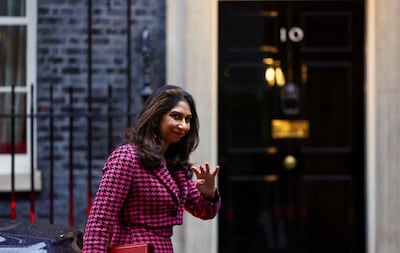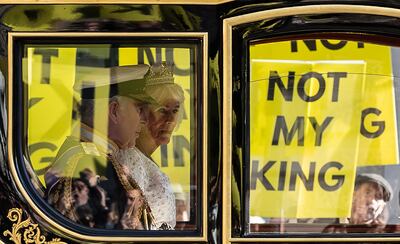Among the finer qualities of Britishness, tolerance of controversial, even uncomfortable opinion might be placed fairly high.
The tradition of treating dissent as legitimate and healthy, unless it escalates into incitement to – or the practice of – violence or hatred, has its equivalent on the other side of the English Channel.
Words often attributed to the 18th-century French writer and moraliser Voltaire, from Europe’s so-called Age of Enlightenment school of philosophy, read: “I disapprove of what you say but I will defend to the death your right to say it.”
In reality, there is no record he ever uttered or wrote the phrase, any more than Voltaire was his real name as opposed to the nom de plume of Francois-Marie Arouet. The phrase was conjured by a biographer, though happily there is broad acceptance that it accurately reflected his own beliefs.

Voltaire died 245 years ago. He may be spinning in his grave as fears are voiced that high-minded attachment to free speech is no longer shared by a UK government seen by detractors as increasingly authoritarian.
Rishi Sunak’s government proposes to extend the definition of extremism to target any individual or group deemed to undermine British institutions and values.
According to the Observer newspaper, documents marked “sensitive” and drafted by civil servants working under a senior minister, Michael Gove, list specific organisations that could be caught by the refined definition, including the Muslim Council of Britain (MCB) and Palestine Action and Muslim Engagement and Development.
The stated aim is to devise a fresh, unified response to extremism, targeting “the promotion or advancement of any ideology which aims to overturn or undermine the UK’s system of parliamentary democracy, its institutions and values”.
Not all officials are on message: one told the newspaper anonymously he fears a “crackdown on freedom of speech … the definition is too broad and will capture legitimate organisations and individuals”.
The theme is not new. Western governments regularly raise concerns about outlooks that seem at odds with their countries’ fundamental principles. France has ordered the disbandment of several organisations, from the far right as well as the far left, whose activities or polemic suggest justification for violence.
But what the UK government appears to be doing alarms not only such potentially menaced groups such as the MCB but civil rights organisations fearing a cynical denial of free speech. “It has never been the British way to arrest people for thought crime,” Martin Bright, from the Index on Censorship, told The Observer.
Mr Gove’s Department for Levelling Up, Housing and Communities launched its review of “non-violent extremism” earlier this year and a plan incorporating the new definition is expected to emerge soon.
Britain’s Conservative government, desperate to improve wretched opinion poll rating, is trying to regain the trust of disenchanted supporters ahead of a general election expected late next year or the beginning of 2025.
One result is a gradually more populist stance on social issues, presumably to appease strands of conservative opinion dismayed by so-called “wokeness”, failures to tackle immigration and disruption caused by demonstrators on environmental and other contentious issues.

There has already been tough new legislation limiting the right to protest. Police officers have wrongly arrested journalists covering Just Stop Oil activities, a worrying reminder that well-meaning changes can be interpreted over-zealously, and somehow detained for 13 hours a blameless royalist who found herself close to demonstrators while waiting to see King Charles III pass on his way to be crowned in May.
The Metropolitan Police initially compounded the inexplicable error by passing the buck to an outside force, one of whose officers carried out the arrest, neatly ignoring that the Met’s role was in overall charge of coronation security operations.
During the unfolding crisis in the Middle East, Home Secretary Suella Braverman has condemned pro-Palestinian protests as “hate marches”.
A few taking part might be motivated by hatred; the UK has seen anti-Semitic acts and the tearing down of posters highlighting the plight of people cruelly taken hostage by Hamas on October 7. Yet a majority of the demonstrators are peace loving, and they are protesting because they are appalled at the catastrophic impact of Israel’s response on Gaza.
It is worth remembering that only a few weeks have passed since Britain’s press regulatory body found that Ms Braverman had wrongly claimed in a newspaper article that nearly all child-grooming gangs were men with Pakistani roots. This “significantly misleading” assertion, it said, contradicted her own ministry’s research showing most offenders were white.
On a more mundane level, Ms Braverman has also floated the idea of restricting the use of tents by homeless people. A former prison worker told one radio phone-in discussion that this made a mockery of the practice of issuing possibly unsettled prisoners with tents when released.
The Labour opposition’s shadow home secretary, Yvette Cooper, has ridiculed Ms Braverman’s “pound-shop Trump approach” and says no serious government would trust her in so senior a position. The obvious explanation for Mr Sunak’s reluctance to dismiss her is that he sees her unedifying posturing as a vote-winner – or that she poses a real threat to his leadership.
Impressions of growing intolerance on the right are reinforced by repeated attacks on news outlets suspected of adopting an anti-conservative agenda. To those campaigning to “defund the BBC”, stripping it of taxpayer support, it is irrelevant that plenty on the left or in the centre detect pro-conservative bias in much of the broadcaster’s output. And it is hardly in dispute that the right overwhelmingly dominates the printed press.
Mr Gove’s department says there is no place for extremism.
“Over the last few years, we have taken action to tackle hatred and those who seek to divide us,” a representative told The National. “As you would expect, we keep our approach to tackling extremism under review to ensure it meets the evolving challenge it poses.”
The precise timetable is unclear. The was no mention in the King’s Speech setting out the coming parliamentary programme, and the department “does not comment on leaks”.
Maybe the Voltaire philosophy has run its course.
Conservatives – enraged when student bodies deny platforms to speakers whose views they despise – would doubtless be aghast at the suggestion that they wish to suppress freedom of expression. But it may be a telling paradox that for far too many, of all political persuasions, speech must indeed be free provided it echoes their own thoughts.


